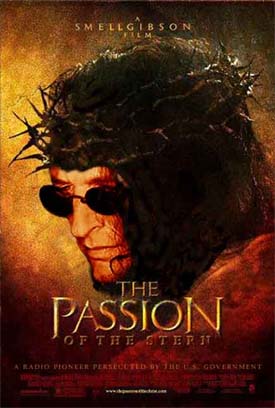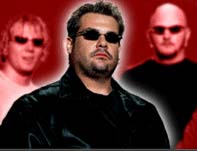
|
|
|
|
Morning Radio Faces Tough Challenges |
|
The fine was leveled because of nine alleged violations on a March 13, 2003 broadcast of the network's Elliot in the Morning show involving "graphic and explicit sexual material…designed to pander to, titillate and shock listeners," the Associated Press reported. The only dissenting commissioner complained that the fine wasn't high enough. Clear Channel, which owns 1,200 stations nationwide, continues to chew its nails over increased Congressional scrutiny and promises to clean up its act. Stern believes his days are numbered and he is fighting back, calling for support from his audience and turning to friendly D.C. solons. (Stern recently asked frequent guest Rep. Jose Serrano (D-New York), to put him on his staff so he could appear at hearings, passing notes and whispering in the Congressman's ear, like in the old crime movies.) Howard Stern didn't spring full blown from the head of Zeus; there is a lineage in the freaky world of wakeup radio. What started out more than seventy years ago as an experiment merging audience building and uncommon salesmanship with light-hearted goofiness, has devolved into a world of powerful "shock jocks" and right wing demagogues. In the early 1930s Frank Cope initiated the Alarm Klok Klub on KJBS in San Francisco, California, broadcasting from 5 to 8AM every morning, except Sunday. Cope was a master of studied casualness; spinning records and the first to spoof the advertiser's copy. "Cope was probably the world's first bona fide disk jockey, and his daily…[program] was San Francisco's most popular radio program for nearly twenty-five years," John F. Schneider wrote in his 1997 The History of KJBS, San Francisco. While Cope became a regional phenomenon, Arthur Godfrey took this new folksy laid back morning radio format to the nation. "Although Arthur Godfrey is often given credit for being the first radio personality to ad lib commercials and kid his sponsors," Schneider wrote, "Cope was doing all this on KJBSin the 1930's." But Godfrey, who was later to become a television icon, perfected the one-on-one style of morning talk; a friendly voice that seemed to be talking to each member of the listening audience. Soon, across the 48, wakeup shows began cropping up on powerful outlets, but local, spontaneous independents - with their own newsmen, local advertising base, and community feel - came to rule the roost by 1950. Through the 1950s and 1960s, "personality" radio featured controversial local morning hosts who gave exposure to a group of heady iconoclasts (the so-called "sick comics") such as Lenny Bruce, Mort Sahl, Jonathan Winters, Mike Nichols and Elaine May, Shelley Berman. This morning show access to comedy promotion is codified to this day. As younger, wilder "Top 40" morning men replaced "personalities" the atmosphere for the shock jock format was coming in to play. 1970s male hyper-egos slowly took talk around the clock; by the Reagan era it orbited to the right, and off the charts. During the past thirty years rock-rapping anarchic morning punks who thrive on dirty jokes and character assassination emerged. Pre-prepped packaging dictates the warp'n'growl of today's talk shows, prime time news, chest beating sports talk radio and, perhaps most significantly, the egregious barking head TV pundits.
These days, a Michael Powell-driven FCC appears to be itching to flex its muscles, adding larger fines and perhaps even contesting the licenses of multiple offenders. (Currently, the FCC does not currently have power over cable and satellite-only channels, so viewers of The L Word and The Sopranos have thus far been spared the lawmakers collective wrath.) In late February, Clear Channel, in a transparent attempt to cover its derriere, announced a "Responsible Broadcasting Initiative" designed, the company said in a press release, "to make sure the material aired by its radio stations conforms to the standards and sensibilities of the local communities it serves." It's a bit premature to declare Howard Stern's reign as king of shock radio over, but if it is there may be a bright future for him on satellite. According to CNNMoney.com, "there has been rampant speculation that Stern might eventually join Sirius Satellite Radio, or XM Satellite Radio, which like pay cable stations, are not subject to the same decency and obscenity rules that affect major TV networks and terrestrial radio stations." According to Paul La Monica, "Stern has some 15 million listeners nationwide, versus little more than 1.5 million for XM and 260,000 for Sirius." Coincidentally, or not, writes La Monica, "both satellite radio stocks have bucked the market's downward trend: Since Feb. 2 (the day after the Super Bowl halftime show that kicked off much of the indecency backlash), shares of Sirius are up about 3 percent while XM Satellite has gained 7 percent." At the same time, "shares of traditional radio operators Clear Channel Communications and Citadel Broadcasting are down 7 percent." For what may be his final mainstream-radio battle Stern is casting himself both as a political organizer and a martyr. "There's only one thing you can do," Stern said on a recent show. "Remember me in November when you're in the voting booth. I'm asking you to do me one favor. Vote against Bush. That's it." Stern's Web site, which recently began linking to a number of anti-Bush articles, also has on prominent display a poster: "The Passion of The Stern: A Radio Pioneer Persecuted By The U.S. Government." Research assistance by Arnie Passman, author of The DeeJays, a history of disc jockeys (MacMillan Publishing Company, January 1971). |
 Howard Stern's satirical response to the FCC's continued attacks against his morning talk show
Howard Stern's satirical response to the FCC's continued attacks against his morning talk show  Bubba the Love Sponge was kicked off the air by Clear Channel after the FCC imposed hefty fines on the corporation
Bubba the Love Sponge was kicked off the air by Clear Channel after the FCC imposed hefty fines on the corporation